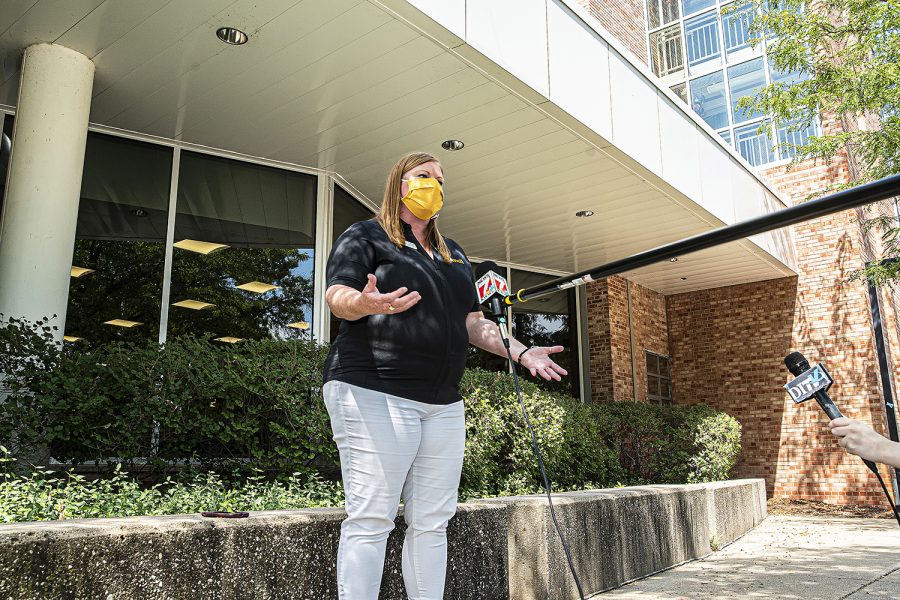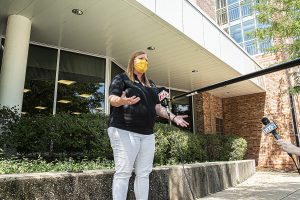Opinion | Isolation dorms need to change
The experience of Ann Gaughan shows that the plans the University had for returning students are not sufficient.
University of Iowa Director of Orientation Services, Tina Arthur in front of Burge Residence Hall on Monday, August 17th, 2020. The university is currently attempting to adjust their housing and orientation plans around the Coronavirus pandemic to maintain health and safety.
August 26, 2020
The University of Iowa Housing and Dining Facility issued an apology to students after freshman Ann Gaughan’s quarantine experience went viral on social media.
Gaughan told The Daily Iowan there was dirt on the ground and bed. The curtains and sink were unclean. The hall coordinators explained to Gaughan this was because nobody was expected to move into the room after just arriving on campus.
Gaughan’s room should have been far more livable. She told the DI she slept on the floor and in the morning, there were ants on the bed.
If UI had prepared beforehand, they could have cleaned the rooms so any students who needed to could have moved into a room with decent conditions right away.
I don’t think it would have been unreasonable for UI to prepare for a student testing positive for COVID-19 a day after moving into the residence halls. Plenty of students traveled or spent quarantine in another country over the summer.
UI has no way of knowing how well students moving into the residence halls were following public health guidelines.
Considering all the above, a student moving into the residence halls might have contracted COVID-19. They also might not know they have it due to showing mild or no symptoms.
In order for the university to get through this pandemic, all its facilities must care about students. They need to do everything possible to ensure they have all the needed resources to keep students as safe and comfortable as possible.
This means the UI Housing and Dining facility should have been clean, comfortable, and livable in isolated dorms before move-in. The university also could have made it easier for students who need to be quarantined to find out about it.
The university did not require students to get COVID-19 testing during move in. This means students who, unlike Gaughan, don’t choose to get tested might not know they need an isolated room before it is too late and they might have already infected someone.
This defeats the whole purpose of isolated rooms.
As the DI previously reported, Gaughan was not allowed to tell her roommate or anyone she had been in contact with about the positive test result. They might have contracted COVID-19 and needed to quarantine but the UI provided no way to check.
Kelcey Greenwood, Gaughan’s roommate, was denied her requests to switch rooms and have the room cleaned. It was reasonable of Greenwood to ask the university to do these things. It being cooperative could have helped ensure she did not get the virus from Gaughan.
UI should do whatever it takes to prevent students getting sick. Again, without them doing that, the isolation rooms have little purpose.
It is likely the UI’s poor response was due to needing to save money after being closed for months and still not being fully reopened. While I understand the university is struggling financially, saving money should not cost students comfort and safety.
Not only would preparing the isolated rooms have been the ethical thing to do, it also would have prevented making mental health even worse than it is. Gaughan told the DI she was tired from crying and needed an ambulance to be called after experiencing a panic attack.
Moving away from home and starting college while in the middle of a pandemic is already stressful, scary, and emotional enough when done separately. Having these two events occur simultaneously exacerbates the mental health issues incoming freshmen can face.
Students’ psychological and physical wellbeing should not be made worse due to the university’s lack of preparedness.
Columns reflect the opinions of the authors and are not necessarily those of the Editorial Board, The Daily Iowan, or other organizations in which the author may be involved.





